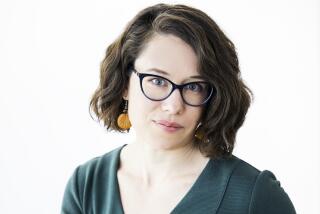CHURCH COUNCIL LOOKS AT TV SEX AND VIOLENCE
- Share via
Can the level of sex and violence in the media be decreased without resorting to censorship?
That is the central question being addressed by the National Council of Churches in two days of hearings this week at the Sheraton-Universal Hotel. The Los Angeles hearings are part of the “first religious national study that seriously examines problems presented by sex and violence in the media and at the same time is dedicated to preserving the constitutional freedom of speech,” said the Rev. James M. Wall, editor of the Christian Century magazine, who is chairing the council’s Committee on Sex and Violence in Film, Cable TV and Commercial Television.
The question before the council was described as “a stickler” by the Rev. William F. Fore, the organization’s assistant general secretary for communication. And so it proved to be on the first day of hearings Tuesday, during which several entertainment industry figures discussed the problem.
“I don’t want anybody, no matter how well-intentioned to tell me what to write,” said Gene Reynolds, who produced “MASH” and “Lou Grant” for five years each. Reynolds conceded that the media often did “a poor job,” but nonetheless said that he was “apprehensive” about anything stronger than persuasion to induce networks to program quality shows.
Fore, however, noted that “we’ve been trying to do that for 30 years.”
Before the hearings started, Fore said that the types of actions the council could be looking at include pressure on advertisers or a push for legislation mandating more quality children’s programming.
Sharon Maeda, head of listener-sponsored Pacifica Radio network, suggested that the council create an award similar to the Humanitas Awards sponsored by the Human Family Institute. Earlier, Reynolds had cited that award as providing important recognition of quality work.
Maeda, who said she does not own a television set, also suggested that churches look at their investment portfolios to see if ownership of stock in networks or sponsors could be used as leverage.
Robert E. Lee, who co-wrote the plays “Inherit the Wind” and “Auntie Mame” with Jerome Lawrence, listed about half a dozen scenes of extreme violence in his current nuclear-war-themed teleplay, “What If?” But violence on screen, he said, often is a reflection of real life. “Media excesses may be deplorable, but they are not causal.”
Reynolds, Maeda and Lee were the first of several entertainment industry notables and researchers scheduled to testify during the two-day hearings. Questioners on the panel included Nelson Price, director of electronic media for United Methodist Communications; Lydia Ann Talbot, communication director for the Chicago Council of Churches; Betty Elam, director of broadcasting for the United Presbyterian Church, Fore and Wall.
Also presenting their views on Tuesday were Patricia Greenfield, author of “Mind and the Media: The Effects of Television, Video Games; actor David Soul; Maurie Goodman of NBC’s Broadcast Standards department; Neil Malamuth, chairman of the communication studies department at UCLA, and David Levy of the Caucus of Producers, Writers and Directors.
Scheduled to participate today are producer-writer William Sackheim (“The Competition”), TV writer Steve Bello (“St. Elsewhere”), Group W Vice President Christine Foster and film critic Arthur Knight, among others.
The hearings came about following complaints from church members regarding the increasing amount of “dehumanizing sex and excessive violence” in film and on TV, according to Fore. Many church members, Fore said, are particularly concerned about pay-TV services, which are often purchased for their family theatrical fare but which also bring R-rated movies into the home.
Studies presented during a first round of hearings held in New York last September determined that there is a link between media violence and real-life violence. “It’s the same as cancer and smoking,” Fore said. “You can never prove that smoking causes cancer, but the relationships are so clear that you can see there is a social problem.”
The National Council of Churches plans to hold a third hearing this spring in Washington, where public policy alternatives will be explored. A fourth hearing will be held somewhere in the Midwest. Results will be incorporated into a report to be presented in November to the group’s governing board for adoption as policy.
Fore emphasized that the National Council of Churches, which represents the “mainline” Methodist, Lutheran, Presbyterian and Episcopal churches, is a traditionally liberal organization that is in no way associated with the Moral Majority and other such groups opposing media sex and violence. The National Council of Churches includes in its membership 32 denominations representing about 41 million Americans.
“We don’t think censorship is the answer,” Fore said in an interview before Tuesday’s hearings. “What we’re looking for is some kind of solution that will protect First Amendment rights and still decrease sex and violence in the media.”
More to Read
The biggest entertainment stories
Get our big stories about Hollywood, film, television, music, arts, culture and more right in your inbox as soon as they publish.
You may occasionally receive promotional content from the Los Angeles Times.









